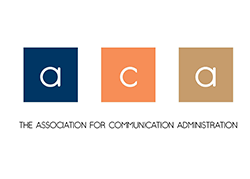Abstract
Communication skills are a core requirement for administrators in higher education. Evidence for this proposition can be found in the job announcements for administrators and in the conferences they attend. The Council of Colleges of Arts and Sciences’ (CCAS) annual conference is a place for deans and other administrators from around the country to gather to work on becoming better at “deaning.” For the past few years, a pre-conference workshop titled “Conflict Management for Deans,” has been offered, and serves as a perfect example of the importance of our discipline to higher education administration. In a quick review of the job advertisements in the Chronicle of Higher Education, it easily becomes clear that “communication skills” are a basic requirement for most leadership positions in higher education. Here, we take that notion one step further by discussing some specific communication concepts, theories, and strategies that reflect those skills and that show the significance of effective communication in higher education administration. We focus on five areas of communication and how they have impacted our transitions into administration: presentation skills, interpersonal skills, small group skills, affinity-seeking behaviors, and listening.
Recommended Citation
DelGaizo, K. R., Frymier, A. B., & Mottet, T. P. (2013). The application of basic communication skills to higher education administration. Journal of the Association for Communication Administration, 32(2), 87-94.


